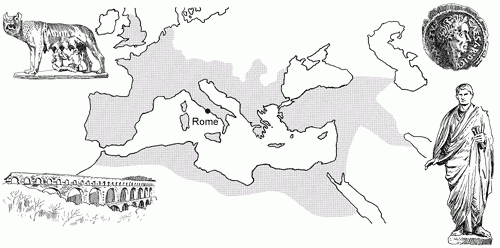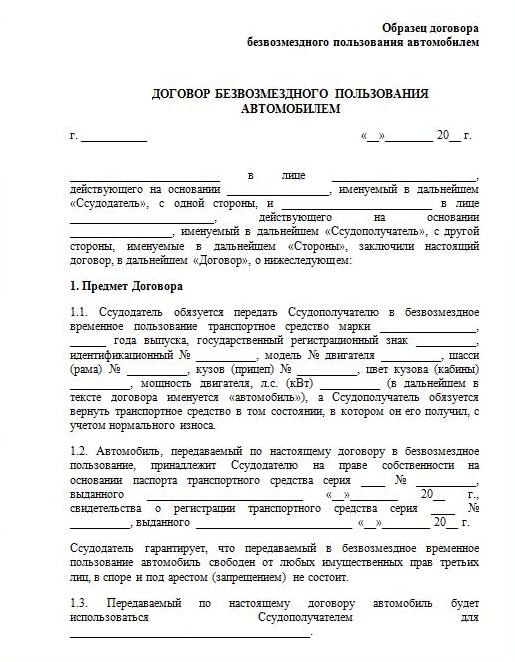The institute of contractual relations of civil law is quite large, and its importance is growing more and more every year, given the fact of the development of social relations. Today, with the help of contracts, almost all branches of human life are regulated. In addition to the regulatory function, contracts are the main source of obligations between subjects of civil law. However, the article will discuss a loan or a contract for gratuitous use. This example of a source of commitment is intrinsically interesting. It contains many aspects that even seasoned lawyers are unaware of. It should also be noted that the loan was known back in ancient Rome, so this relationship has rich roots. Features and signs of a loan, we will consider the example of a contract for the gratuitous use of a car.
Private Roman Loan
As mentioned earlier, a gratuitous car agreement is a classic example of a loan. Such legal relations were known even in ancient Rome. In the civil legislation of the Russian Federation, the loan obligation has retained its historical traditions with a small proportion of changes that are simply necessary in the modern world. Roman lawyers defined a loan as follows: this relationship in which one side transfers the individualized thing for use to the other side. At the same time, the second party using the thing agrees to transfer it intact upon termination of use. Roman lawyers pay much attention to the subject of the contract. This is always the property owned by the lender, which is determined by individual characteristics and is not consumed. Also, in Roman law, all aspects of the contract were described (responsibility of the parties, their obligations, etc.).
In the civil legislation of the Russian Federation, the loan obligation has retained its historical traditions with a small proportion of changes that are simply necessary in the modern world. Roman lawyers defined a loan as follows: this relationship in which one side transfers the individualized thing for use to the other side. At the same time, the second party using the thing agrees to transfer it intact upon termination of use. Roman lawyers pay much attention to the subject of the contract. This is always the property owned by the lender, which is determined by individual characteristics and is not consumed. Also, in Roman law, all aspects of the contract were described (responsibility of the parties, their obligations, etc.).
What is a loan?
According to the Civil Code of the Russian Federation, a loan is a gratuitous use agreement that governs the legal relationship in which one party assumes the obligation to transfer for temporary use, at the same time, the thing for free, and the other - the obligation to return the thing in a certain period of time. The condition of the thing should be the same as before its transfer to use. A gratuitous use agreement is in many ways similar to a lease, but the latter is almost always paid. The entire array of contractual actions (conclusion, termination, change of parties, etc.) is indicated in Chapter 6 of the Civil Code of the Russian Federation. The contract for the gratuitous use of a car is a loan, therefore the provisions of the relevant chapter of the code are fully applicable to it. An individual feature of the contract is that its subject is a car.
The condition of the thing should be the same as before its transfer to use. A gratuitous use agreement is in many ways similar to a lease, but the latter is almost always paid. The entire array of contractual actions (conclusion, termination, change of parties, etc.) is indicated in Chapter 6 of the Civil Code of the Russian Federation. The contract for the gratuitous use of a car is a loan, therefore the provisions of the relevant chapter of the code are fully applicable to it. An individual feature of the contract is that its subject is a car.
Gratuitous use of the car: general information about the contract
A gratuitous car agreement is a classic loan. According to this legal relationship, one party undertakes to transfer the vehicle to the other side for the purpose of temporary use. The peculiarity of such use is that the borrower does not pay anything for using the vehicle, based on the principle of the gratuitousness of this type of agreement, which is prescribed in article 689 of the Civil Code of the Russian Federation.As for the right to transfer a car, this is not the exclusive right of the owner or person who, by virtue of an agreement or law, has the necessary authority to give a vehicle for temporary use. Given all of the above aspects, we can conclude that the contract for the gratuitous use of the car has the following inherent features:
- gratuitous use;
- The right to use is transferred only by an authorized person.
Features of the subject of the contract
The agreement presented in the article has a rather specific subject, namely, a vehicle - a car. In other words, a device designed to transport goods, people, etc. The main requirement for the subject of the contract is its individuality, that is, it must be non-consumable, one of a kind. The object is individualized in the process of daily operation. Thus, a person transfers for use his unused property, which can be distinguished in a mass of homogeneous things of the same type. This aspect is very important because the borrower agrees to return the same thing that was given to him earlier, with all its features.
The object is individualized in the process of daily operation. Thus, a person transfers for use his unused property, which can be distinguished in a mass of homogeneous things of the same type. This aspect is very important because the borrower agrees to return the same thing that was given to him earlier, with all its features.
Principle of gratuitousness
A contract for the gratuitous use of a car, a sample of which will be presented below, is drawn up on the basis of the principle of gratuitousness (article 692 of the Civil Code of the Russian Federation), which comes from the very name of the relationship.

The essence of the principle is that the lender does not receive any benefit from the transfer of use of the thing. Therefore, the sphere of nascent legal relations relates exclusively to the trusting or charitable sphere of social relations. At the time of direct ownership of the thing, the user is title owner. Gratuitousness emphasizes the absence of any commercial objectives of the contract. An analogy is the issuance of library books.
It follows that a car is given for gratuitous use only in the event of a trusting or other relationship between the lender and the user, provided that there is no commercial interest. This agreement cannot be taken for a rental agreement, the use of a car for which does not occur at all. Leasing always implies payment, which completely excludes gratuitousness.
Who can be parties to the contract?
The legislator did not create any restrictions on the subjects that may draw up a contract for the gratuitous use of a car. Fiz. persons, legal entities and other entities authorized by law may be parties to this agreement. This feature significantly expands the rights of the parties, as well as their capabilities in the field of regulation of relations arising between them. For example, a tenant of an enterprise may transfer property of that enterprise in cases where such is not expressly prohibited by the lease.
Form of a contract for gratuitous use of a car
The general terms and conditions of transactions apply to the contract, which are detailed in Chapter 9 of the Civil Code of the Russian Federation. In most cases, a written form is not required, although parties can write it in order to protect themselves.

A mandatory written form is provided only if one of the parties to the contract is a legal entity, or the cost of the item itself is ten times higher than the minimum wage. This feature is indicated in article 161 Civil Code. In addition to the contract for the gratuitous use of a car, the following accompanying documents must go:
- Certificate of car registration.
- Protocol of disagreements and reconciliation of these disagreements.
- The agreement is additional.
Essential conditions
When a contract for the gratuitous use of a car is concluded, physical. persons or legal entities must take into account the essential conditions without which the agreement is recognized as invalid.Such conditions include gratuitousness and the subject of the contract. The latter should be described in detail (model, color, car license plates, etc.). The conditions are binding on any form of contract and any interests that are regulated by it, even if the parties enter into a contract for the gratuitous use of a car with a crew. Also, all accompanying documents that were presented in the article earlier must be present.
Ways to terminate the contract
The termination of the contract for the gratuitous use of the car may be made at the end of the specified periods or ahead of schedule. Article 698 of the Civil Code of the Russian Federation regulates the methods of early termination:
1) The lender (the thing is not used in accordance with the contract, the obligations to maintain the car in proper condition are not fulfilled, the condition of the car has worsened, the vehicle has been transferred to a third party).
2) By the borrower (deficiencies were found that impeded the use of the thing, during the conclusion of the contract, the lender did not inform about the rights of third parties to the car, the lender did not fulfill his obligation to transfer the car for use).
There is an opportunity to completely abandon the contract for gratuitous use, as described in article 699 of the Civil Code of the Russian Federation. But at the same time, each side must notify the other one month before failure. The contract ceases to exist due to death, the liquidation of one of the parties to the contract.
Responsibility of the Parties

The contract for the gratuitous use of a car, the form of which can be found in the article, must necessarily have in its structure the responsibility of the parties for violations of the terms of the contract.
Under general conditions, the lender is obliged to provide all the necessary information regarding the aspects of using the thing, as well as about the rights of others to the subject of the contract.
The main responsibility of the borrower is to ensure the safety of the car. In case of failure to comply with this clause of the contract, the borrower is obliged to compensate for the damage. If the car is damaged or unsuitable for further use due to the actions of the borrower, he is fully responsible for this. He is also responsible for any harm that was caused to him when using the thing. Thus, the main responsibility lies entirely with the borrower, who is actually the titular owner.
Above, we reviewed the contract for the gratuitous use of the car. It is difficult to find a model of such an agreement, because the legislator gives the right to make a transaction orally. Nevertheless, all aspects and features of concluding a contract for the gratuitous use of a vehicle were presented.








